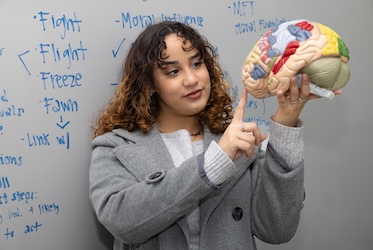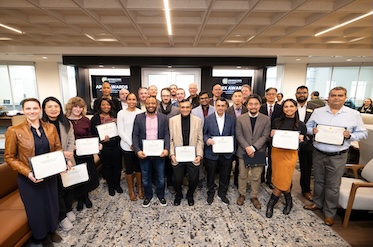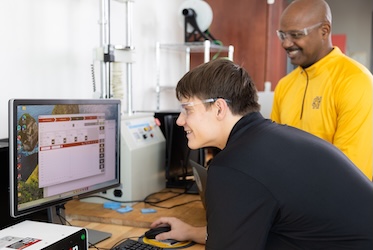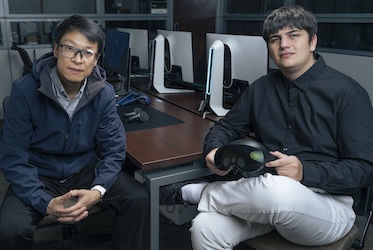

KENNESAW, Ga. | Sep 4, 2020

Kennesaw State University faculty members from computer science and mathematics education will help local middle school students enhance their computational skills and mathematics aptitude through a half-million-dollar grant from the National Science Foundation.
Kennesaw State assistant professor of computer science and information systems Alan Shaw, associate professor of mathematics education Brian R. Lawler and computer science lecturer Deepa Muralidhar received the three-year, $498,276 grant. The grant is part of the NSF’s Computer Science for All initiative that aims to give all pre-K through 12 students in the U.S., especially minority and female students, the opportunity to participate in computer science and computational thinking education in their schools.
Through the grant, faculty and students from KSU’s College of Computing and Software Engineering and Bagwell College of Education will work with two middle schools in Clayton County, Georgia, to enhance students’ mathematics proficiency by incorporating computing activities into mathematics classes. That will include providing curriculum modules and professional development for teachers and tablet computers for every student to use in the classroom and at home.
“Our approach to getting every child to learn computer science is to bring it into the math classes, because everybody has to take math,” Shaw said. “We will make computing an applied math, so students study an abstract concept by doing an activity on a computer that enables them to learn the math in a fun way.”

“What we learn will influence an emerging teacher certification program at Kennesaw State to train teachers in both mathematics and computer science instruction,” Lawler said. “Teachers who follow this program will be dual-certified and highly sought-after in local school districts.”
Undergraduate students in computer science also will participate as research assistants, helping to develop the computing apps that will be used in the middle school classrooms and helping to train and facilitate teachers and students who will be using those apps. Also providing teacher training will be Bill Crombie, the director of professional development for The Algebra Project, a mathematics education initiative in which Shaw and Lawler are actively involved.
By focusing on middle school students, Shaw said, the grant initiative will reach children at a critical age. He cited studies showing that waiting until high school to introduce students to computer science is often too late for them to develop an interest in it.
“One aspect of the Computer Science for All initiative is trying to get a broader pipeline of people to go into computing fields,” Shaw said. “But you need math for a lot of career fields, so, if we can improve kids’ math skills, we will be opening many doors for them.”

The National Science Foundation grant awarded to Shaw, Lawler and Muralidhar runs through the end of 2023, but their work could continue well beyond then. If the Kennesaw State team reaches their goals during the three years of this grant, they will be able to apply for further NSF grant funding to expand to other grade levels and communities.
“If it’s a great success, we expect to be doing the worked launched by this grant for the next 10 years,” Shaw said. “Using the same Computer Science for All mechanism, I think we will be able to expand this to include high school students and extend it beyond Clayton County to a lot of other school districts.”
– Paul Floeckher
Photos by Jason Getz and Submitted

Kennesaw State student explores how trauma affects decision-making

Top researchers recognized for achievements at Apex Awards

Kennesaw State team innovates stronger 3D-printed structures through advanced simulations

Student, faculty researchers explore how AI can improve STEM learning through virtual reality
A leader in innovative teaching and learning, Kennesaw State University offers undergraduate, graduate, and doctoral degrees to its more than 51,000 students. Kennesaw State is a member of the University System of Georgia with 11 academic colleges. The university's vibrant campus culture, diverse population, strong global ties, and entrepreneurial spirit draw students from throughout the country and the world. Kennesaw State is a Carnegie-designated doctoral research institution (R2), placing it among an elite group of only 8 percent of U.S. colleges and universities with an R1 or R2 status. For more information, visit kennesaw.edu.